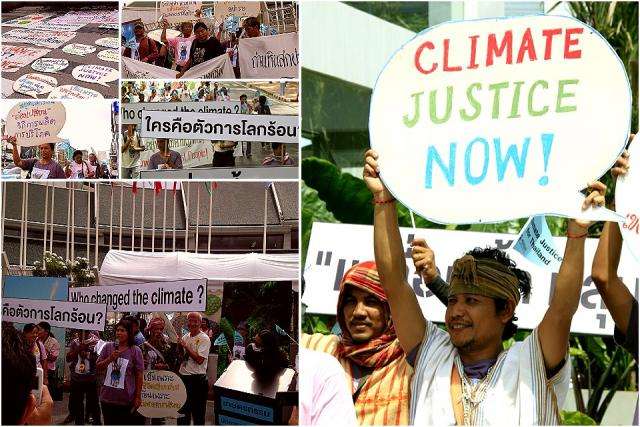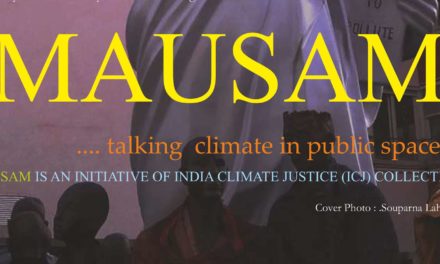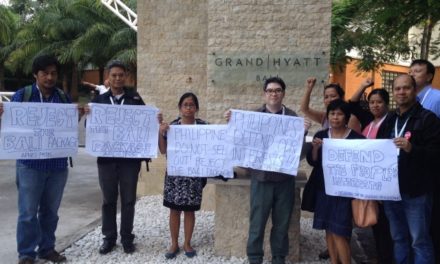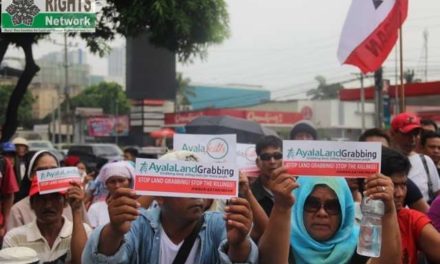Civil society networks are gathered again to demand justice and call on the governments of the world to step up to their responsibilities in the negotiations to resolve the climate crisis. They urge the governments of every country and the business lobby groups to stop playing games and negotiating for their own benefit in the midst of the climate crisis which is building up all over the globe. From 30 August until 5 September 2012, government representatives are meeting at the UN buildings in Bangkok to develop a work plan and seek agreement in the important issues for the 18th meeting of the Parties to the UN Framework Convention on Climate Change (UNFCCC) known as COP18 in Doha, Qatar at the end of this year.
The Thai civil society networks gathered here today, which include community forest networks, alternative agriculture networks, the land reform networks, ethnic and indigenous peoples networks, consumer networks, networks following development projects and various power plants, and the Thai Working Group for Climate Justice, insist once again on their demands to the international governments and the Thai government to build justice for the people and society in managing the problems of climate change as follows:
1. All governments including the Thai government must signal their willingness to commit to reduce greenhouse gases (GHG) emissions with the utmost urgency, on the principle of common but differentiated responsibilities. This means that industrialised countries must reduce the emission of greenhouse gases by at least 80% by the year 2020.
2. Policies, legal mechanisms and national tax systems must be developed that increase justice, that hold those who created the problems to their responsibilities, and which stop using mechanisms to shift the responsibility on to others through the market, or other inappropriate policies.
3. Ruling elites in the developing countries must not avoid their responsibilities and duties by saying that in their countries there are poor people who must continue to emit GHGs to alleviate poverty when the benefits from the economic and development structure remain with the capital groups and not the poor who take on the burden of the problems of the climate crisis.
4. The United Nations must find a solution and establish a process for justice which protects the rights of the indigenous peoples and the villagers in the forest areas.
5. The Thai government must urgently rethink its direction and policies as follows:
5.1 Stop the development of market and offset mechanisms, carbon credits.
5.2 Reform the power sector to ensure equitable acess to clean power and promote the planning and the decentralisation of electricity generation at the community level.
5.3 Revoke the power development plan (PDP) and set up a transparent process for people to participate in energy planning, achieve a greater proportion of (clean) renewable energy as set out in the Alternative Energy Development Plan (AEDP) and carry out energy conservation according to the energy conservation plan, and especially to stop the use of energy from coal, which is dirty energy and is an important driver of global warming, cancel the nuclear development plan and the construction of nuclear power plants, which are risky and not sustainable.
5.4 Regulate and cancel the development of large-scale industrial projects which generate large amounts of pollution, such as petrochemical industries, primary steel production plants, coal plants, etc and halt the expansion of industrial estates throughout the country.
5.5 Stop all development projects which destroy the food resource base, which is the basis of food security at the local and national level.
5.6 Cancel the construction of dams throughout Thailand and in the Mekong region, because apart from damaging the forests and major river basin ecosystems of the region, they also create problems for the climate. People who suffer or will receive the impacts of the dam projects, especally those in the region of the Mekong watershed, must participate in every step of the state’s decision-making process.
5.7 The state must recognise the rights and way of life of the local communities who rely on and sustinably manage resources in the forest, and resolve the conflicts over the rights to farmland of the people who rely on the conservation forest area, with the utmost urgency.
5.8 The Thai state must stop the unjust eviction, destruction of the crops, arrests and prosecution of farmers, and stop applying the National Parks Department’s “global warming” formula, which distorts academic knowledge to call for damages from farmers on the pretext of “global warming”.
5.9 The state must promote and support the equitable redistribution of landholding eg to set up a land bank and establish a progressive rate land tax, as well as recognise and support the management of land through community title, according to the rights of communities enshrined in sections 66 and 67 of the Constitution.
5.10Establish a process for communities themselves to manage local resources, both above and below ground, including minerals and forests.
5.11Support change within the agricultural sector of the country, and in particular to give importance to small-scale farmers, and to work towards sustainable and organic agriculture which recognises the way of life and culture of communities, and is friendly to the eco-system, can reduce the emission of greenhouse gases, and is a sensible way to support the agricultural sector to adapt to global warming.
Signed by:
- Organic Agriculture Group of Sanam Chaikheid District, Chachoengsao province กลุ่มเกษตรอินทรีย์ อำเภอสนามชัยเขต จังหวัดฉะเชิงเทรา
- Bonok Local Area Conservation Group กลุ่มรักษ์ท้องถิ่นบ่อนอก
- Assembly of the Poor กลุ่มสมัชชาคนจน
- Wangwon Community Network Rights Group, Trang province กลุ่มสิทธิเครือข่ายชุมชนวังวน จังหวัดตรัง
- Thapsakae Conservation Group กลุ่มอนุรักษ์ทับสะแก
- Khao Lao Yai-Phajandai forest conservation group, Nongbualamphu province กลุ่มอนุรักษ์ป่าเขาเหล่าใหญ่-ผาจันได จังหวัดหนองบัวลำภู
- Baan Krud natural forest and environment conservation group กลุ่มอนุรักษ์ป่าธรรมชาติและสิ่งแวดล้อมบ้านกรูด
- Sustainable energy working group Surin province คณะทำงานพลังงานยั่งยืนจังหวัดสุรินทร์
- Thai Working Group for Climate Justice คณะทำงานเพื่อโลกเย็นที่เป็นธรรม
- Alternative Agriculture Network เครือข่ายเกษตรกรรมทางเลือก
- Network of Thai people who reject nuclear power stations, Ubon Ratchathani province เครือข่ายคนไทยไม่เอาโรงไฟฟ้านิวเคลียร์ จังหวัดอุบลราชธานี
- Network of people who reject coal fired power stations, Kantrang district, Trang province เครือข่ายคนไม่เอาโรงไฟฟ้าถ่านหิน อำเภอกันตรัง จังหวัดตรัง
- Network to oppose nuclear power plants, Trat province เครือข่ายคัดค้านโรงไฟฟ้านิวเคลียร์ จังหวัดตราด
- Consumer protection network, Trat province เครือข่ายคุ้มครองผู้บริโภค จังหวัดตราด
- Indigenous and Ethnic people’s network of Thailand เครือข่ายชนเผ่าพื้นเมืองแห่งประเทศไทย
- Network to monitor the impacts of coal-fired power plant projects, Khao Hin Son sub-District, Phanomsarakham District, Chachoengsao เครือข่ายติดตามผลกระทบโครงการโรงไฟฟ้าถ่านหิน ตำบลเขาหินซ้อน อำเภอพนมสารคาม จังหวัดฉะเชิงเทรา
- Bantad Mountain Range Land Reform Network เครือข่ายปฏิรูปที่ดินเทือกเขาบรรทัด
- Northern Land Reform Network เครือข่ายปฏิรูปที่ดินภาคเหนือ
- Northeastern land reform network, Chaiyaphum province เครือข่ายปฏิรูปที่ดินภาคอีสาน จังหวัดชัยภูมิ
- Thai Land Reform Network เครือข่ายปฏิรูปที่ดินแห่งประเทศไทย
- Thai network of the people who own mineral resources เครือข่ายประชาชนผู้เป็นเจ้าของทรัพยากรแร่ประเทศไทย
- Network of concern about REDD เครือข่ายเฝ้าระวังเรดด์
- Northeastern people’s network to protect their native land “land water fish forest minerals” เครือขายพลเมืองปกป้องแผ่นดินเกิด “ดิน น้ำ ปลา ป่า แร่” ภาคอีสาน
- Eastern people’s network, Rayong province เครือข่ายภาคประชาชนภาคตะวันออก จังหวัดระยอง
- Lamae conservation network, Lamae district, Chumporn province เครือข่ายรักษ์ละแม อำเภอละแม จังหวัดชุมพร
- Informal labour network เครือข่ายแรงงานนอกระบบ
- Nuclear study group, Kalasin province เครือข่ายศึกษานิเวคลียร์ จังหวัดกาฬสินธุ์
- Northeastern network of community organisation councils of Mekong River basin เครือข่ายสภาองค์กรชุมชนลุ่มน้ำโขงภาคอีสาน (คสข.)
- Consumer protection network, Khanthuli sub-district, Thachane’ District, Suratthani province เครือข่ายสิทธิคุ้มครองผู้บริโภค ตำบลคันธุลี อำเภอท่าชนะ จังหวัดสุราษฎร์ธานี
- Natural resource and environmental conservation network, Ratchaburi province เครือข่ายอนุรักษ์ทรัพยากรธรรมชาติและสิ่งแวดล้อม จังหวัดราชบุรี
- Network for the conservation of agricultural practices Nongsaeng-Phachi เครือข่ายอนุรักษ์วิถีเกษตรกรรมหนองแซง-ภาชี
- Sustainable Agriculture Foundation (Thailand) มูลนิธิเกษตรกรรมยั่งยืน (ประเทศไทย)
For additional information contact the Thai Working Group for Climate Justice :
Jacques-Chai Chomthongdi, tel: 0846550666 or Kingkorn Narintarakul, tel: 0815308339






![[IN PHOTOS] In Defense of Human Rights and Dignity Movement (iDEFEND) Mobilization on the fourth State of the Nation Address (SONA) of Ferdinand Marcos, Jr.](https://focusweb.org/wp-content/uploads/2025/07/1-150x150.jpg)



